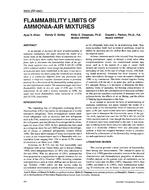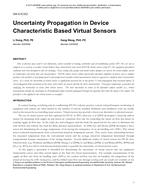A masonry wall, having known heat transfer properties, was installed between the metering and climatic chambers of a calibrated hot box (CHB). Time-dependent excitation functions, including a sol-air diurnal cycle, a four-harmonic diurnal cycle, a step function, and a triangular pulse were generated in the climatic chamber. The metering chamber was maintained at a typical indoor condition and was used as a calorimeter. The transient heat transfer rate at the inside surface of the wall specimen at hourly time steps was determined from an energy balance of the metering chamber. The measured specimen heat transfer rate determined for each of these excitation functions was compared with good agreement to predicted values using an analytical model.
For each of the excitation functions, empirical transfer function coefficients (TFCs) for the masonry wall were determined by curve fitting the measured specimen heat transfer rate. The empirical TFCs derived from the diurnal cycle tests successfully predicted the specimen heat transfer rate for the other excitation functions. However, these sets of TFCs were not unique and differed from those obtained from an analytical model.
Units: Dual
Citation: ASHRAE Transactions, 1988, vol. 94, pt. 1, Dallas, TX
Product Details
- Published:
- 1988
- Number of Pages:
- 16
- File Size:
- 1 file , 1.2 MB
- Product Code(s):
- D-DA-88-3119


